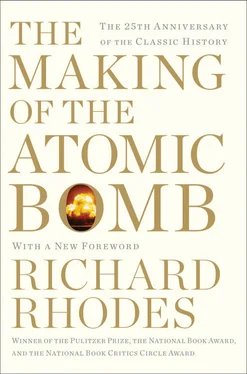Bethe at twenty-seven was sturdy, indefatigable, a skier and mountain climber, exceptionally self-confident in physics if still socially diffident. 692His eyes were blue, his features Germanic; his thick, dark-brown hair, cut short, stood up on his head like a brush. His custom of plowing through difficulties eventually won Bethe comparison with a battleship, except that this particularly equable vessel usually boomed with laughter. He had already published important work.
Born in Strasbourg on July 2, 1906, Bethe moved during childhood to Kiel and then to Frankfurt as his father, a university physiologist, achieved increasing academic success. He did not think of himself as a Jew: “I was not Jewish. 693My mother was Jewish, and until Hitler came that made no difference whatever.” His father’s background was Protestant and Prussian; his mother was the daughter of a Strasbourg professor of medicine. He counted two Jewish grandparents, more than enough to trigger the Tübingen dismissal.
Bethe began university studies at Frankfurt in 1924. Two years later, recognizing his gift for theoretical work, his adviser sent him to Arnold Sommerfeld in Munich. Sommerfeld had trained nearly a third of the full professors of theoretical physics in the German-speaking world; his protégés included Max von Laue, Wolfgang Pauli and Werner Heisenberg. The American chemist Linus Pauling came to work with Sommerfeld while Bethe was there, as did the German Rudolf Peierls and Americans Edward U. Condon and I. I. Rabi. Edward Teller arrived from Karlsruhe in 1928, but before the relationship between the two young men could develop into friendship Teller was incapacitated in a streetcar accident, his right foot severed just above the ankle. By the time the amputation healed, Sommerfeld had gone off on a sixtieth-birthday trip around the world, leaving Bethe, who had just passed his doctoral examinations, to look for a job on his own; missing Sommerfeld, Teller chose to move on to Leipzig to study with Heisenberg. Bethe went to the Cavendish on a Rockefeller Fellowship, then to Rome, before accepting appointment at Tübingen.
Since Geiger refused to help challenge his Tübingen dismissal, Bethe appealed to Munich. “Sommerfeld immediately replied, ‘You are most welcome here. I will have your fellowship again for you. Just come back.’” 694After a time in Munich Bethe was invited to Manchester, then to Copenhagen to work with Bohr. In the summer of 1934 Cornell University offered him an assistant professorship. One of his former students, now on the Ithaca physics faculty, had recommended him for the post. He accepted and shipped for America, arriving in early February 1935.
Teller took his Ph.D. under Heisenberg at Leipzig in 1930, stayed on there for another year as a research associate, then shifted to Göttingen to work in its Institute for Physical Chemistry. “His early papers,” Eugene Wigner writes, “were entirely in the spirit of the times: the expanding world of the applications of quantum mechanics.” 695Teller probed the more developed part of physics—chemical and molecular physics—with vigorous originality, producing some thirty papers between 1930 and 1936, most of them written with collaborators because he was sloppy at calculation and impatient with the detailed effort of following through.
“It was a foregone conclusion that I had to leave,” Teller remembers. “After all, not only was I a Jew, I was not even a German citizen. I wanted to be a scientist. The possibility to remain a scientist in Germany and to have any chance of continuing to work had vanished with the coming of Hitler. 696I had to leave, as many others did, as soon as I could.” The director of his institute, Arnold Eucken, “an old German nationalist,” confirmed Teller’s conclusion as they left on the same southbound train for spring vacation in March 1933. 697“I really want you here,” Teller remembers Eucken equivocating, “but with this new situation, there is no point in your staying. I would like to help you, but you have no future in Germany.” 698The problem then was where to go. Back in Göttingen after a tense confrontation with his parents in Budapest—they wanted him to stay in Hungary—Teller sat down to apply for a Rockefeller Fellowship to Copenhagen to work with Bohr.
In Hamburg Otto Frisch decided he would have to take Hitler seriously after all. Frisch, a personable young experimentalist with a gift for ingenious invention, worked for Otto Stern, the tubby Galician who apprenticed under Einstein and who had barked at Ernest Lawrence four years previously to get busy on his notion of a cyclotron. Stern was “quite shocked,” Frisch writes, “to find that I was of Jewish origin, just as was he himself and another two of his four collaborators. 699He would have to leave and the three of us as well,” although “the University of Hamburg—with the traditions of a Free Hansa city—was very reluctant to put the racial laws into effect, and I wasn’t sacked until several months after the other universities had toed the line.”
Before the Nazis promulgated the civil service law Frisch had applied for, and won, a Rockefeller Fellowship to work with Enrico Fermi in Rome. The program was designed to free promising young scientists from their immediate duties for a year of research abroad, after which they were expected to return to duty again. At a time of crisis the foundation unfortunately chose to enforce its rules narrowly. Frisch was soon “very disappointed and at first rather disgusted when [the foundation] told me that, the situation having changed because of the Hitler laws, they had to withdraw [their] offer of a grant because I no longer had a job to come back to.” 700
In the meantime Bohr turned up in Hamburg. He was traveling throughout Germany to determine who needed help. “To me it was a great experience,” Frisch writes, “to be suddenly confronted with Niels Bohr—an almost legendary name for me—and to see him smile at me like a kindly father; he took me by my waistcoat button and said: ‘I hope you will come and work with us sometime; we like people who can carry out “thought experiments”!’” (Frisch had recently verified the prediction of quantum theory that an atom recoils when it emits a photon, a movement previously considered too slight to measure.) “That night I wrote home to my mother… and told her not to worry: the Good Lord himself had taken me by my waistcoat button and smiled at me. That was exactly how I felt.” 701
Stern, secure personally in independent wealth and international reputation, set out to find places for his people. “Stern said he would go traveling,” continues Frisch, “and see if he could sell his Jewish collaborators—I mean find places for them. And he said he would try to sell me to Madame Curie. So I said, ‘Well, do what you can. I’ll be very grateful for anything you can do. Just sell me to whoever wants to have me.’ And when he came back [from visiting laboratories abroad] he said that Madame Curie had not bought me, but Blackett had.” 702Patrick Maynard Stuart Blackett, London-born, tall, a Navy man, with a lean, vigorous face, was one of Rutherford’s protégés and a future laureate. He had just departed the Cavendish for a workingmen’s college in London, Birkbeck, after a furious argument over the extent of the Cavendish teaching load. “If physics laboratories have to be run dictatorially,” Blackett had sworn, emerging white-faced from Rutherford’s office, “I would rather be my own dictator.” 703Birkbeck was a night school; experimenters could work at peace all day, except when Blackett’s automatic cloud chamber, triggered by a passing cosmic ray, went off like a cannon in their midst. It was temporary duty. Frisch took it. When the appointment ran out the following year he crossed the North Sea to Copenhagen to work with the Good Lord.
Читать дальше












